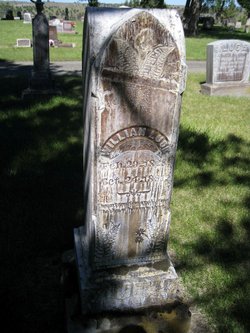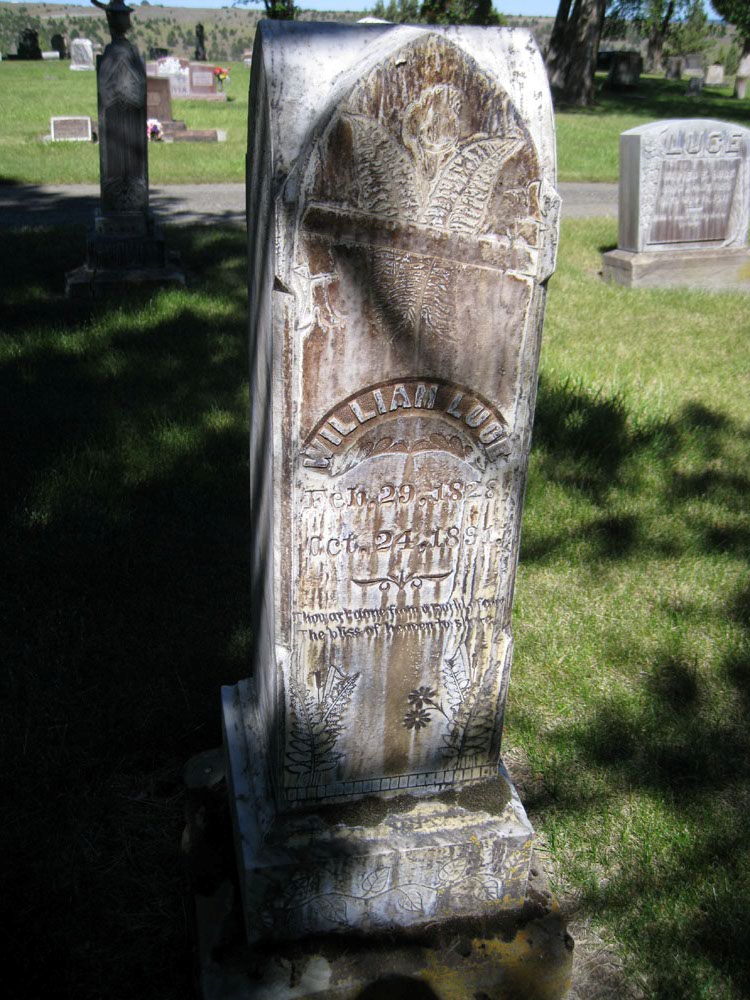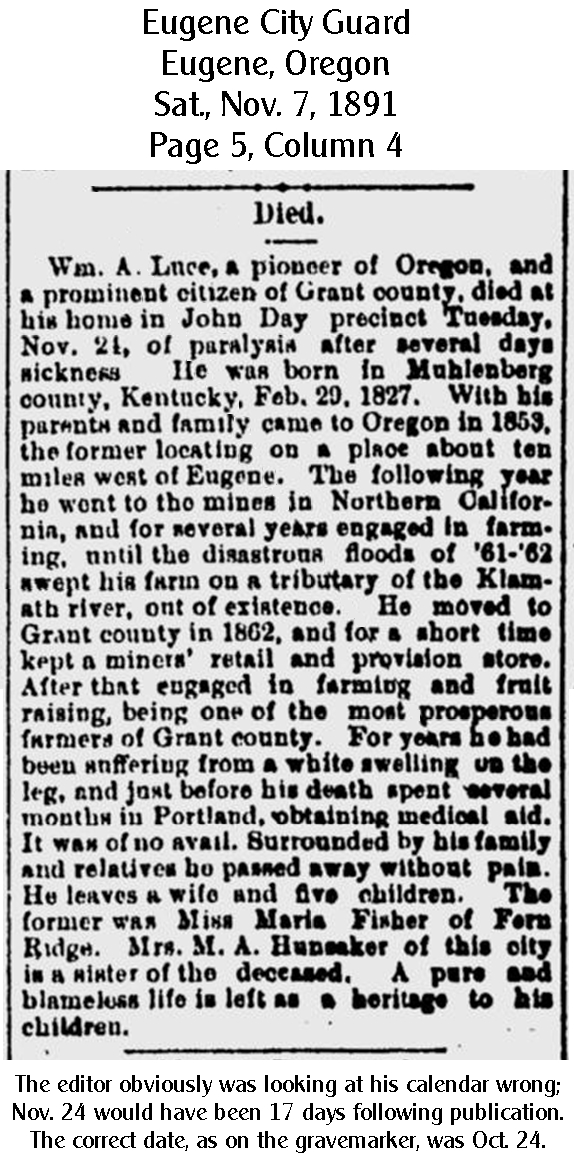Grant Co., Ogn.
February the 3rd 1873
Hon. Geo. H. Williams
Dear Sir I beg leave to trespass on your time for a very short time. I will come to the point at once. You doubtless know of the war now going on with the Modocs. What I have to say is this. There is little doubt if this war lasts two months longer that all the Snakes will join in the conflict. There are now at Camp Harney only troops enough to guard the government property, say, forty effective men. There are estimated to be three hundred Indian braves immediately around Camp Harney. These Snakes are wild Indians, have positively refused their agent to go on any reservation. They are very vicious and warlike. You recollect doubtless that no officer ever gained any advantages over them for years of war until General Crook took command. There are nominally two companies of men stationed at Camp Harney. These companies have dwindled down to thirty-five to forty men to the company.
Thirty-five of these men are now with the troops around Capt. Jack's camp. Now you can see what will happen in case the Snakes break out. The few troops we have will be powerless to protect the defenseless settlers in all the Snake country. The Indians will destroy vast herds of stock in every direction. They will not lack for provisions, for they will subsist on the vast herds of the stock in their own country. I hope you will be so kind as to lay this matter before the proper authorities, and the President. It may save the lives of many women & children if this matter is attended to at once. It would be well to force these Indians onto reservations, and made to stay there, and then when they left the reservation people would know that there was something wrong and be on their guard. But now they roam at will where they like, and people have no apprehension of danger until it is too late.
Very respectfully yours
Wm. Luce
(NARA Series M234 Letters Received by the Office of Indian Affairs 1824-81, Reel 617 Oregon Superintendency, 1842-1880, 1872, frames 775-779.)
////////////////////////////////////////////////////////////////////////////////////////////////////////////
Blue Mountain Eagle
June 2, 1922
First I will tell how Wm. Luce and wife, Maria E. Luce, and 5 children: Charles, Henry, E.E., and two sisters, Marian and Carrie who was a baby about 9 months old at that time, arrived in Grant County. The family wintered the winter of 1862-1863 in Eugene and father in Canyon City in the store. David Luce and James Cozart divided their time in the store and on the place where J.A. Laycock now lives, looking after the mules and other work. They built a log cabin just a little west of where the Laycock house now stands and also a small blacksmith shop for their own use. They wintered their mules out on the hills. Of course, they were herded of days and corraled at night. They had made one trip to The Dalles early in the spring and loaded light, and on the second trip, father came ahead of the pack train and brought his family to The Dalles. I don't remember the date we left The Dalles but we reached the place where Laycock now lives June 09, 1863.
We were packed in a good sized box and to make it even there was 100 pounds of flour on the other side. No one led this mule but it was turned loose with the rest of the mules. Some of the packers were Wells Stone, Henry Barker, Zack Vernoeinan, Joe Beckworth, John C. Luce, James Cozart, and father. The next trip Beckworth was killed by an Indian near the McKenna place. They stopped to fix a mule's pack and fell out over something. Both went for their pistols and both fired but Beckworth missed and he was shot through the breast. The Indian came on up and told us as near as he could what had happened and some of the men went back and brought Beckworth up to the cabin. He only lived a little while and was buried on the hill above the road almost where the line crosses between Laycock's and Penfield's place.
In the spring of 1864 several places were settled on. David Luce took up the place now owned by DeLore, Mrs. Belshaw, Wynn Allen, and John Silvers, and a part of the Begg ranch; Charles Belshaw where A.W. Dunn now lives; and John Herburger the place now owned by B.C. Trowbridge; and then father's place and Mr. Thompson, and Wm. Abrams on the place now owned by John Silvers. The first place taken farther down was the place now owned by Fletcher, taken by David Beech afterwards selling to Wm. Ingle. The road crossed the river there and crossed back again above where the Workins bridge now stands, and then crossed back again where Walt Carsner now lives. In case of high water they would follow through the hills all the way from the South Fork.
When you cross the river to where Mt. Vernon stands, some of the earliest settlers were John Adams, Wm. Bonham, Wm. McDonald, Joe Robertson, Wells Stone, James Clark; and across the river: Rileys, Thomas and Ryan, and then the Charles Wagner place where Vic Mosier now lives, and one of the oldest houses on the river. Harve Fields, James Cummings, and Widow Lathum, Aldrich, Casy, Officer, Bracketts, Snyder, Mack, and of course others. Among the early settlers were Murray Bros., Cap. Lewis, Perkins, Wood, Mascalls, Highland, Reeves, Jim Small, Vaughan, Grandpa Lester, Belshaw, Hayes, Dustin, Herburger, Bowsman, Frey, Jenkins, Penfield, and above John Day some of the first places taken were: Joel Howard, DeMoss Bros., Babcock, John Anglen, Hall Bros. and Wm. Settlemeier.
There were two men killed and Wm. Davis killed both of them, a man by the name of Wey that worked for David Luce, and McGill, and this is how the trouble came about. Davis ran a saloon and he and Wey were always good friends. Davis was a Democrat and Wey a Republican. A good many times Wey had run a little bill at Davis' saloon and so on Election Day, he did the same and never thought but what it would be alright, but when he went out by Mosier's blacksmith shop to get on his horse to go home, Davis came out and asked him for the money and Wey took it all in good part and said; "Why, Bill, I can't pay you today. I haven't any money with me, but I will pay you the first time I come to town."
Davis said: "If you don't pay it before you leave town, I will kill you" so trouble began to brew. Wey started to untie his horse and Davis pulled his gun and so did Wey but the horse jerked and Wey missed, so did Davis miss Wey the first shot, but he killed McGill and the second shot he struck Wey in the breast. He lived five days. I saw him every day as I was going to school in John Day at that time. Wm. Davis left that night and went to Winnemucca and was there for many years. Wey was taken to the home of Wm. Whit. Mrs. Whit was a half-breed but she had a good clean heart and was a good wife, mother and neighbor. Whit, some years later just as he was starting to Ft. Harney with grain, was killed. He was driving 10 horses and 2 wagons. In going down a little hill, he leaned forward to pull on the brake and lost his balance and fell off his horse and under the front wheels of the wagon, but by this time it was upgrade and as the brake was on, the wagon did not run over him, but his horse walked on his head and face mashing him up awful. He lived about 36 hours and died in father's house. They had three children. Lots of people will remember Bill Whit and of course quite a few remember the girls Helen and Eliza.
E.E. Luce
*This follows Mr. Luce's article:
The Spanish spelling of Canyon City was used by the first miners on the creek. It was spelled Canon City. Tents first sprang up on Whiskey Flat. There was not room enough so the miners strung down the creek and lined up on one long narrow street, and this ran parallel with the creek. The street was a mere alley. There were about 12 saloons along the tinted alley and by fall 1,500 miners were washing gold from the gravel in the creek.
Grant Co., Ogn.
February the 3rd 1873
Hon. Geo. H. Williams
Dear Sir I beg leave to trespass on your time for a very short time. I will come to the point at once. You doubtless know of the war now going on with the Modocs. What I have to say is this. There is little doubt if this war lasts two months longer that all the Snakes will join in the conflict. There are now at Camp Harney only troops enough to guard the government property, say, forty effective men. There are estimated to be three hundred Indian braves immediately around Camp Harney. These Snakes are wild Indians, have positively refused their agent to go on any reservation. They are very vicious and warlike. You recollect doubtless that no officer ever gained any advantages over them for years of war until General Crook took command. There are nominally two companies of men stationed at Camp Harney. These companies have dwindled down to thirty-five to forty men to the company.
Thirty-five of these men are now with the troops around Capt. Jack's camp. Now you can see what will happen in case the Snakes break out. The few troops we have will be powerless to protect the defenseless settlers in all the Snake country. The Indians will destroy vast herds of stock in every direction. They will not lack for provisions, for they will subsist on the vast herds of the stock in their own country. I hope you will be so kind as to lay this matter before the proper authorities, and the President. It may save the lives of many women & children if this matter is attended to at once. It would be well to force these Indians onto reservations, and made to stay there, and then when they left the reservation people would know that there was something wrong and be on their guard. But now they roam at will where they like, and people have no apprehension of danger until it is too late.
Very respectfully yours
Wm. Luce
(NARA Series M234 Letters Received by the Office of Indian Affairs 1824-81, Reel 617 Oregon Superintendency, 1842-1880, 1872, frames 775-779.)
////////////////////////////////////////////////////////////////////////////////////////////////////////////
Blue Mountain Eagle
June 2, 1922
First I will tell how Wm. Luce and wife, Maria E. Luce, and 5 children: Charles, Henry, E.E., and two sisters, Marian and Carrie who was a baby about 9 months old at that time, arrived in Grant County. The family wintered the winter of 1862-1863 in Eugene and father in Canyon City in the store. David Luce and James Cozart divided their time in the store and on the place where J.A. Laycock now lives, looking after the mules and other work. They built a log cabin just a little west of where the Laycock house now stands and also a small blacksmith shop for their own use. They wintered their mules out on the hills. Of course, they were herded of days and corraled at night. They had made one trip to The Dalles early in the spring and loaded light, and on the second trip, father came ahead of the pack train and brought his family to The Dalles. I don't remember the date we left The Dalles but we reached the place where Laycock now lives June 09, 1863.
We were packed in a good sized box and to make it even there was 100 pounds of flour on the other side. No one led this mule but it was turned loose with the rest of the mules. Some of the packers were Wells Stone, Henry Barker, Zack Vernoeinan, Joe Beckworth, John C. Luce, James Cozart, and father. The next trip Beckworth was killed by an Indian near the McKenna place. They stopped to fix a mule's pack and fell out over something. Both went for their pistols and both fired but Beckworth missed and he was shot through the breast. The Indian came on up and told us as near as he could what had happened and some of the men went back and brought Beckworth up to the cabin. He only lived a little while and was buried on the hill above the road almost where the line crosses between Laycock's and Penfield's place.
In the spring of 1864 several places were settled on. David Luce took up the place now owned by DeLore, Mrs. Belshaw, Wynn Allen, and John Silvers, and a part of the Begg ranch; Charles Belshaw where A.W. Dunn now lives; and John Herburger the place now owned by B.C. Trowbridge; and then father's place and Mr. Thompson, and Wm. Abrams on the place now owned by John Silvers. The first place taken farther down was the place now owned by Fletcher, taken by David Beech afterwards selling to Wm. Ingle. The road crossed the river there and crossed back again above where the Workins bridge now stands, and then crossed back again where Walt Carsner now lives. In case of high water they would follow through the hills all the way from the South Fork.
When you cross the river to where Mt. Vernon stands, some of the earliest settlers were John Adams, Wm. Bonham, Wm. McDonald, Joe Robertson, Wells Stone, James Clark; and across the river: Rileys, Thomas and Ryan, and then the Charles Wagner place where Vic Mosier now lives, and one of the oldest houses on the river. Harve Fields, James Cummings, and Widow Lathum, Aldrich, Casy, Officer, Bracketts, Snyder, Mack, and of course others. Among the early settlers were Murray Bros., Cap. Lewis, Perkins, Wood, Mascalls, Highland, Reeves, Jim Small, Vaughan, Grandpa Lester, Belshaw, Hayes, Dustin, Herburger, Bowsman, Frey, Jenkins, Penfield, and above John Day some of the first places taken were: Joel Howard, DeMoss Bros., Babcock, John Anglen, Hall Bros. and Wm. Settlemeier.
There were two men killed and Wm. Davis killed both of them, a man by the name of Wey that worked for David Luce, and McGill, and this is how the trouble came about. Davis ran a saloon and he and Wey were always good friends. Davis was a Democrat and Wey a Republican. A good many times Wey had run a little bill at Davis' saloon and so on Election Day, he did the same and never thought but what it would be alright, but when he went out by Mosier's blacksmith shop to get on his horse to go home, Davis came out and asked him for the money and Wey took it all in good part and said; "Why, Bill, I can't pay you today. I haven't any money with me, but I will pay you the first time I come to town."
Davis said: "If you don't pay it before you leave town, I will kill you" so trouble began to brew. Wey started to untie his horse and Davis pulled his gun and so did Wey but the horse jerked and Wey missed, so did Davis miss Wey the first shot, but he killed McGill and the second shot he struck Wey in the breast. He lived five days. I saw him every day as I was going to school in John Day at that time. Wm. Davis left that night and went to Winnemucca and was there for many years. Wey was taken to the home of Wm. Whit. Mrs. Whit was a half-breed but she had a good clean heart and was a good wife, mother and neighbor. Whit, some years later just as he was starting to Ft. Harney with grain, was killed. He was driving 10 horses and 2 wagons. In going down a little hill, he leaned forward to pull on the brake and lost his balance and fell off his horse and under the front wheels of the wagon, but by this time it was upgrade and as the brake was on, the wagon did not run over him, but his horse walked on his head and face mashing him up awful. He lived about 36 hours and died in father's house. They had three children. Lots of people will remember Bill Whit and of course quite a few remember the girls Helen and Eliza.
E.E. Luce
*This follows Mr. Luce's article:
The Spanish spelling of Canyon City was used by the first miners on the creek. It was spelled Canon City. Tents first sprang up on Whiskey Flat. There was not room enough so the miners strung down the creek and lined up on one long narrow street, and this ran parallel with the creek. The street was a mere alley. There were about 12 saloons along the tinted alley and by fall 1,500 miners were washing gold from the gravel in the creek.
Inscription
"Thou art gone from a world of care, the bliss of heaven to share"
Gravesite Details
Beside his wife Maria E. Fisher Luce
Family Members
Advertisement
Records on Ancestry
Sponsored by Ancestry
Advertisement



















